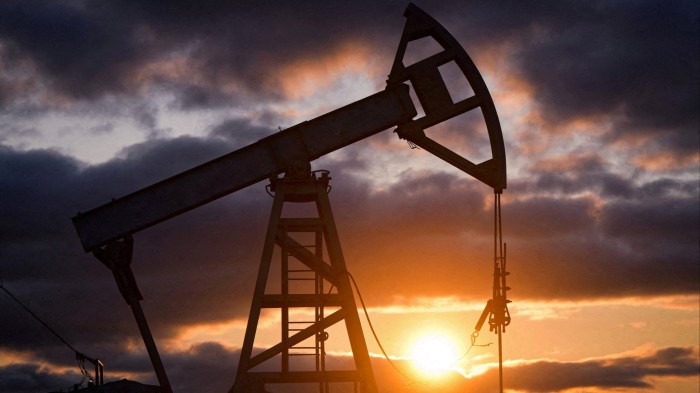Stay informed with free updates
Simply sign up to the Oil myFT Digest — delivered directly to your inbox.
Oil prices tumbled on Thursday as Opec+ unexpectedly announced plans to boost production just as sweeping US tariffs stoked fears of a global economic slowdown.
Eight Opec+ members, including Saudi Arabia and Russia, said they would triple a planned increase in oil production in May, bringing forward a commitment to reverse production cuts over the next 18 months.
The move came hours after US President Donald Trump set out a new tariff regime that investors said was more severe than expected.
The twin developments pushed Brent crude, the global benchmark, down 7 per cent to $69.60 in afternoon trading, on course for its biggest daily drop in almost three years. WTI, the US benchmark, fell 7 per cent to $66.21.
Despite concerns over the damage to global growth from tariffs, the eight Opec+ members said they would increase output by 411,000 barrels a day in May, up from a previous target of 122,000 b/d.
The members, who held a virtual meeting on Thursday, said they had taken the decision “in view of the continuing healthy market fundamentals and the positive market outlook”.
Opec+ members have been holding back production for the past three years, cutting their combined output by almost 6mn b/d to push crude prices higher. That was initially effective, helping to keep crude above $90 a barrel for most of 2022.
But the cuts have become less effective over time because of weak demand growth, increased oil output elsewhere and some Opec+ members pumping above their quotas. In response, the group led by Saudi Arabia began unwinding some of the measures this week.
The decision follows a period of increased tension between members such as Kazakhstan, which has consistently pumped above its quota, and others such as Saudi Arabia, which has shouldered the biggest share of the cuts.
“Bringing forward the unwind is a way to put pressure on the laggards,” said Amrita Sen, director of research at consultancy Energy Aspects.
The decision meant oil was the hardest hit commodity on Thursday, but prices for several others, including copper, aluminium and uranium, also fell despite the White House exempting the metals from tariffs.
Benchmark London copper prices declined 3 per cent to below $9,400 while aluminium dropped 2 per cent to a six-month low.
“Tariffs and the general trade escalation are likely to result in higher prices and inflation . . . [and] will probably affect US economic growth and global economic growth,” said Bryan Bille, policy and geopolitical principal at Benchmark Mineral Intelligence.
Fears of a global recession and the threat of higher inflation could also hit demand for key metals including copper, he added.
Analysts at Benchmark said demand for the commodities could also suffer if tariffs led to higher prices for the products they are used in, such as aluminium cans and home appliances.

